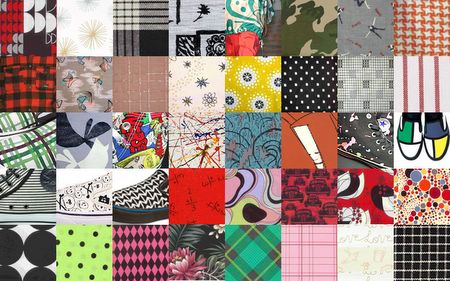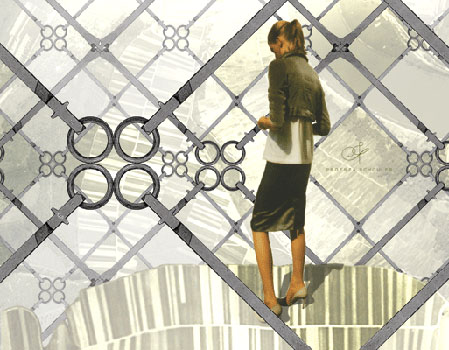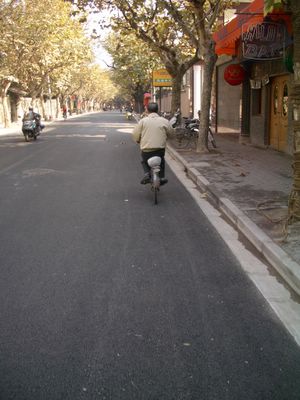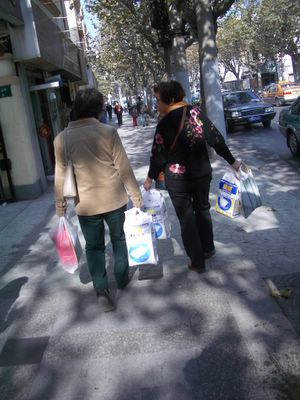Arrived in Donhua, Northeast China, where I lived for one year
| Here I am in Donhua, after 22 hours on the fast train from Guangzhou to Beijing and 22 hours on the slow train from Beijing to Donhua, in Jilin Province. I've been traveling with my gramma. At 75, and with family everywhere, my gramma makes her rounds travelling through the country each year, from the north to the south and back again. On the train up, I got to talk to my gramma about her times as a kid in a Japanese concentration camp in Manchuria. I realized that she was actually a Shandong native (north of Beijing) but ended up in the far north because she was captured by the Japanese when she was eight. After three years in the camp, spending her days playing alone and sometimes with the kids of Japanese settlers, she escaped with her dad to Donhua. They traveled by foot for a month until they reached a place that was not occupied by the Japanese. At 18, she married my grandpa (now passed away). I saw their oooold smudged photographs. They were quite the handsome couple, I have to admit. My gramma is quite happy now that she's here. She runs into old friends everywhere we go. She can understand what people are saying, and everyone talks with the same accent (unlike in south China). The food is to her tastes. I can sort of understand now what it means to be in your "hometown." Instead of skyscrapers and high rise residential, the most landmark features of Donhua are brick smokestacks, constantly emitting coal smoke that make the winter crisp air taste like there's a fire burning everywhere. People walk around in down long coats, wool coats lined with fox fur at the collar and cuffs, and for the wealthier set, minks. The poorer folks where thick cotton coats, underneath lined with layers and layers of clothing. The ladies wear leather boots with pointed toes and thin heels. (I went to the store today, there's a huge selection of nice long wool and fur coats, the kind you think of when you picture society ladies walking down 5th ave on a winter's day, in all shapes and hues ... I figure when it's time for me to invest in a fine coat with a fox collar, I will come back here to buy one). The streets are like a typical Chinese city, a wide road lined with small haphazardly assembled tiny stores and restaurants, sidewalk filled with small vendors. The typical purchase is from small vendors with whom you must bargain or the deal's not cut! (Retail corporations are breaking in, steadily). That one-on-one interface is something very lovely. (I have to say, I prefer arguing with a person over the price of something than handing an item to a salesclerk to bar code in). I heard a while ago that vast majority of merchants in the country are actually these small-time middle men, who end up with goods from the factory but who are not obligated to anyone (franchises, intellectual property rights holders) except themselves. There's not a standardized system where purchases are itemized, price-tagged, taxed, and analyzed. This makes it hard for corporations to really make their way in, because so many purchases are made what we would call, "under the table." They can't tabulate all these exchanges which are floating around in this free free market. They haven't drawn the the people who spill onto the streets into one large box ... yet. If it takes at least one major international brand to make China's economy a real international player instead of a producer, then I say forget the corporate system. But, I'm not an economist. My gramma thinks the standard of living up here has improved a lot, considering north China is one of the poorest urban regions of the country; that is, slower to develop, slower to "catch up" with the world. But, pleeeease, Donhua, don't tear down your real marketplaces for a Carrefour! (Don't you hate it in the states when supermarkets and malls call themselves "marketplaces"? What bullshit is that). Each little shop is emblazoned with a sign in some bright colored Chinese font or calligraphy with the Korean name above or beneath. There is a large population of Koreans in this area they call "chou xian" who speak a brassier, more gruff sounding Korean. The train my gramma and I took here stops in North Korea at a city called Tumen (translated to "dirt door"), I'm guessing it's sort of like a port city or special economic zone where there is a lot of export/import. We shared a cabin with three North Koreans, a younger guy who kept to himself and read a Chinese magazine about military arms and two girls who made big purchases in Beijing (probably to sell in their shop back at home), who played with their cell phones and talked loudly the whole trip. They carried Burberry purses, wore Lacoste tennies and high spikey heeled boots while old men wandered around the train in their long underwear. Ah youth! It's interesting to think that in a certain way, the liberalization policy in China has affected the material lifestyle of their small economy neighbors as well, like North Korea. Here I am on a dsl line where my gramma's old courtyard house used to stand and has been replaced by a 6 story residential apartment building. Such are the costs of modernization. But what can I say? Donhua can now get strawberries in the winter and ladies get to wear minks. (However, in the larger urban centers like Guangzhou, crime rates are getting higher). It's the people in the countryside who haven't got the chance to see a huge change in lifestyle, still feeding their livestock and using chimneys for warmth. I got some very fuzzy pictures of their small brick houses from the train. I think there's this kind of feeling that you're living in a homogeneous place, where people know each other, do the same stuff, eat the same food that comes with being raised or living for a while in the same hometown. Crime rates are low, everyone talks kinda the same, the old people and young people meander the same streets. People squabble in public and there are no noise pollution laws, so shops can turn their speakers into the street and blast however the hell loud they want (mostly Cantonese pop or squeaky, melodic techno). I love how China at the same time makes this connection between all regional groups and even minority groups by recognizing and cherishing each group's traits. I love how people prefer to live close to their families and not move very far away (although do move to make more money in the SEZ's). That babies get to spend lots and lots of time with their grammas through their childhood. That there's a regional and family association that makes you special in a country that's (ideally) like-minded. I wonder if I have that same feeling somewhere in the States. Don't think I'm being nostalgic or aestheticizing this kind of life ... I think there's lots to gain from a living in a place like this. Do you have a feeling so deeply tied to a place and to the people who live there? PS- I wanted to add that even though Donhua is high density urban with quite a hefty population, there is still this feeling between people that it's kind of like a small town. It's no village; people don't sit around the stoop and grow yams all day! :) Still, materially, it's lacking -- for example, hot water only comes twice a week for baths (go to a public bathhouse the other days) and, as I mentioned, the air quality is poor and energy sources are antiquated and unsustainable. Because the whole country is changing so incredibly fast, I don't know what it will be like in a few years. Everything is ephemeral, I suppose. (But, at least I have my gramma for now!) |







